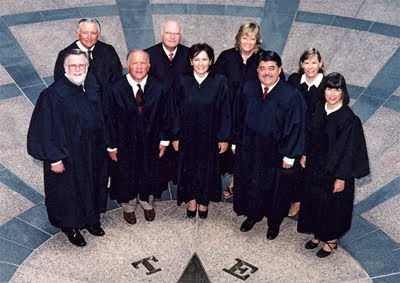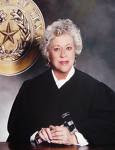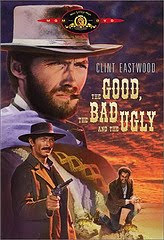0 comment Thursday, July 31, 2014 | admin
 "What does per curiam mean?" I once asked a senior lawyer, back when I was banging around the law library before I started law school. His snarling reaction startled me.
"What does per curiam mean?" I once asked a senior lawyer, back when I was banging around the law library before I started law school. His snarling reaction startled me."When an opinion is per curiam," he said with disgust, "the author is anonymous. It means nobody on the court had the guts to put their name on it." It's often a signal the that the holding is embarrassingly wrong.
 Today we've got a titillating per curiam opinion to peruse, handed down last week by the Texas Court of Criminal Appeals. In Re Charles Dean Hood is the case (2009 WL 2963854).
Today we've got a titillating per curiam opinion to peruse, handed down last week by the Texas Court of Criminal Appeals. In Re Charles Dean Hood is the case (2009 WL 2963854).An exhaustive review of the background of the case (its procedural history is lengthy) would exhaust you. But here is the sordid story in a nut shell.
 One Charles Dean Hood was convicted of capital murder. Which may be all well and good, except that the married judge who heard the case, Verla Sue Holland, and the married guy who prosecuted Mr. Hood, Tom O'Connell, Jr., had been having an illicit affair.
One Charles Dean Hood was convicted of capital murder. Which may be all well and good, except that the married judge who heard the case, Verla Sue Holland, and the married guy who prosecuted Mr. Hood, Tom O'Connell, Jr., had been having an illicit affair.Like everyone else in town, Hood's lawyers had heard rumors about the affair. But no one would confirm it. "Still," you might ask, "Why didn't Hood's lawyers file a motion to recuse the judge?"
Err, well, a lawyer cannot move to recuse a judge unless the lawyer can swear under oath that he has personal knowledge of the judge's conflict of interest or bias (Tex. Rule Civ. Proc. 18a(a)). And if you didn't actually see the judge and the prosecutor in the sack? Then you don't have personal knowledge. Take your seat.
 Not to mention, common sense says if you file a motion to recuse and lose, you and your client risk the wrath of the judge during trial. Judges are powerful people in long black robes. And most people don't like their impartiality questioned.
Not to mention, common sense says if you file a motion to recuse and lose, you and your client risk the wrath of the judge during trial. Judges are powerful people in long black robes. And most people don't like their impartiality questioned.In Mr. Hood's case, filing a motion to recuse, based purely on "rumor and innuendo," would have been an enormous gamble with terrible odds. Most prudent lawyers wouldn't roll those dice if their client were facing the death penalty.
It is understandable, then, that Hood's lawyers didn't raise the affair until after Hood was convicted.
 After the conviction, however, Hood's attorneys doggedly sought to prove the affair, and for several years, to no avail. The pair refused to cooperate in any investigation. In fact, prosecutor Tom O'Connell affirmatively denied his affair with Judge Holland (2009 WL 2963854 at *3).
After the conviction, however, Hood's attorneys doggedly sought to prove the affair, and for several years, to no avail. The pair refused to cooperate in any investigation. In fact, prosecutor Tom O'Connell affirmatively denied his affair with Judge Holland (2009 WL 2963854 at *3).Finally, a former prosecutor from the District Attorney's office gave an affidavit, going on the record to say the affair was common knowledge around the office. Armed with this affidavit, Hood's lawyers were able to use a fairly obscure rule of civil procedure (a "deposition to perpetuate testimony") to question Judge Holland and Mr. O'Connell under oath.
And lo and behold, the pair admitted that indeed, they'd had an affair.
 Both confirmed they'd had a long-standing, secret sexual relationship that they'd tried mightily to cover up. They'd disclosed it to no one, and certainly not to Hood or his lawyers.
Both confirmed they'd had a long-standing, secret sexual relationship that they'd tried mightily to cover up. They'd disclosed it to no one, and certainly not to Hood or his lawyers.Alrighty then. So what was the outcome? Did Mr. Hood get a new trial because the judge and the prosecutor had been carrying on?
Umm, no. Hood got a per curiam opinion from the Court of Criminal Appeals instead, that said he should have brought the affair up along time ago.
 Hood should have moved to recuse the judge before trial (even though his attorneys had no "personal bopping knowledge" and so couldn't have moved to recuse her).
Hood should have moved to recuse the judge before trial (even though his attorneys had no "personal bopping knowledge" and so couldn't have moved to recuse her).Alternatively, said the Court, Hood should have argued he was denied a fair and impartial trial in his previous habeus filings (he did, but the Court said he didn't have enough evidence to prove the affair; 2009 WL 2963854 at *4, FN 15).
In essence, the majority of the Court, led by Presiding Judge "we-close-at five" Keller, said, "Mr. Hood, you're too late. You should have raised this issue back when you didn't have the proof." Three judges, laudably, dissented.
 And the Court's brave per curiam opinion? Was a "DNP," a "do not publish." Which means it will never be binding legal precedent.
And the Court's brave per curiam opinion? Was a "DNP," a "do not publish." Which means it will never be binding legal precedent.Ah. Justice in the wild west of Texas.
Labels: Random
